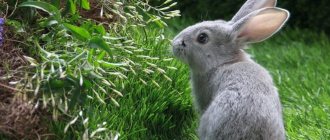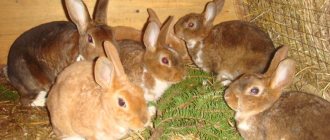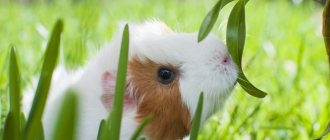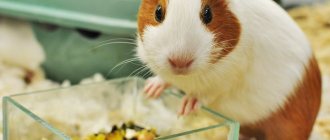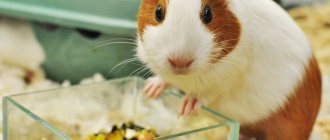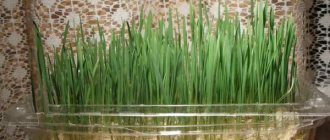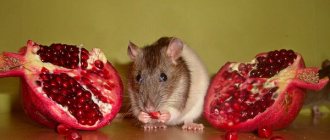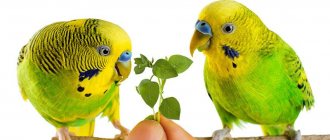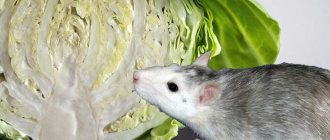Expert opinion
Dobryshev Sergey Anatolievich
Professional rabbit breeder and hare breeder with 30 years of experience
In addition to greens, roughage and succulent feed, the diet of rabbits must necessarily contain cereals, which is necessary for their full development and rapid weight gain. This food is healthy even for small rabbits.
The importance of cereals in the diet
Cereals form the basis of the healthy nutrition pyramid for rabbits. This type of food is useful both for rabbits raised for meat and for ornamental species. Of course, they must be given in reasonable quantities, combined with other types of food.
Healthy cereals for feeding animals include:
- Rice.
- Barley.
- Oats.
- Millet.
- Pearl barley.
You can give the whole grain or cook porridge from it. Mash prepared from cereals is well digestible. This food should be given to small rabbits in the form of well-cooked porridge. Instead of pearl barley and oats, rolled oats would be more acceptable for them.
Can rabbits eat buckwheat? You can find out from the following video:
Feeding rules
Basic rules for feeding rabbits:
- Exceptionally high quality food.
- Balanced diet.
- Mandatory constant presence of water in the drinking bowl.
- Constant nutrition schedule.
- If the portion is combined, cereals are given first, then succulent types of food, and lastly grass or hay.
- New foods should be given in small portions at first, gradually increasing the volume. Transferring an animal from summer to winter nutrition is done in a similar way.
Pearl barley
This grain is especially useful for obtaining high quality wool. Pearl barley contains the following beneficial substances:
- Vitamins A, E, K, as well as group B.
- Macroelements: magnesium, potassium, sodium, phosphorus, calcium.
- Microelements: zinc, iron, manganese, copper, selenium.
You can prepare mash based on pearl barley, which will account for almost half.
Adults are given 80 grams per day, during the period when mating is planned - 95 grams, and females during pregnancy - 85 grams. Pearl barley is part of a rabbit food mixture that can be purchased at pet stores.
Rabbit mash: how to prepare a delicious treat for rabbits
Mash is a delicious treat for rabbits, especially in winter. In this article, I would like to look at mash for rabbits, how to prepare it and what ingredients this delicious “dish” should consist of, as well as many other nuances when feeding domestic rabbits.
The content of the article:
Domestic rabbits will eat the mash with great pleasure. It is the mash that is the main food in small agriculture. Its popularity is due to the fact that with this feeding approach you can save a lot of money. On top of that, a mixture of grain and other ingredients will perfectly saturate the rabbit’s body with all the necessary nutrients. This is very important for small rabbits nursing females - especially in winter. Not long ago, I told you about what rabbits eat at home in winter; we looked at almost all types of food, feeding rules and much more.
Important! It is best to give mash to rabbits in the form of “cutlets”, since they consume it much worse in mushy form. You can always lightly dry the prepared cutlets in the oven, roll them in sunflower cake, sprinkle them with bran, hay flour or dried nettles.
Oats
This cereal is one of the important components of the diet of rabbits that are fattened to obtain a large amount of dietary meat. It is better to offer oats to rabbits in a mixture with other cereal products.
Oats are a high-energy grain feed. Oats contain a large amount of water-soluble and fat-soluble vitamins. If you feed oats in dry form, it is recommended to first crush them into small pieces using a grain crusher.
You can also steam the oats before feeding. To do this, add boiling water to the mixture consisting of oats and other grains so that the water covers the cereal, and leave to stand overnight.
In the morning, you can offer the rabbits the steamed mixture. Another way is to add yeast dough to wet oats. It is necessary to ensure that there is no mold, which gives the food an unpleasant bitter taste, which can lead to rabbits refusing such food.
Expert opinion
Dobryshev Sergey Anatolievich
Professional rabbit breeder and hare breeder with 30 years of experience
Important! Instead of oats, you can offer your rabbits rolled oat flakes. Despite the fact that after processing the nutritional value is slightly reduced and the cost is higher, rolled oats, which are well absorbed by the animals’ bodies, are recommended to be given to rabbits for rapid weight gain. Especially rolled oats, like oats, are recommended to be given to young animals. You can give rolled oats dry or steamed.
Features of the digestive system of rabbits
The main food of lagomorphs is hard-to-digest fiber. The beginning of the digestive system is in the oral cavity, where food is crushed and moistened with saliva. An adult has 28 teeth, a young animal has only 16. When food is chewed, it rolls into the stomach, but since the muscles of this organ have weak muscles, the movement of food along the digestive tract is only possible if a new portion of food is pressed from above. Therefore, a rabbit cannot be put on a starvation diet; the animal will become seriously ill, since the digestive system will not work properly.
The volume of a rabbit's stomach is approximately 200 ml. It is single chambered. When food enters the stomach, it begins to be processed by gastric juice. The processed food then passes from the stomach to the intestines. This is where the final breakdown of food takes place. The proteins, fats, and carbohydrates formed in this process nourish the animal’s body. In the large intestine, fiber is broken down, which the rabbit’s stomach cannot process.
Food is processed in approximately 9 hours.
Rabbit breeders need to be careful when choosing food for their pets. The fact is that rodents can vomit the food they started eating if the food is not of very high quality. Any foreign elements will provoke a gag reflex.
Barley
Barley is an excellent supplier of protein, which is very important for raising rabbits for meat. It also contains a large amount of protein and many vitamins. Barley is a particularly useful addition to the rabbit menu in winter, when there is no fresh grass.
Barley is well absorbed by the body of rabbits and improves their immunity. However, barley should be given to rabbits in limited quantities so as not to cause obesity in the rodents.
Rabbits can be offered sprouted barley sprouts, which contain more nutrients than dry grains. The recommended methods are steaming and yeasting.
How to include red beets and raw potatoes in the diet of rabbits can be found in our article.
Benefits and harms
The benefits of certain types of cereals are invaluable. Wheat, pearl barley, oatmeal, barley and corn cereals can be safely given - when rabbits eat any of these cereals, their body receives the required amount of vitamins, useful micro- and macroelements. If you exclude these cereals from the rabbit menu, this can lead to a slowdown in their growth and deterioration in their health. On the contrary, rice, rye and millet cereals should not be present in the diet.
Due to a weak digestive system, the consumption of such cereals increases the volume of mucus secreted in the stomach in rabbits and provokes further inflammation of the mucous membrane.
Green food for rabbits
This list includes various meadow grasses, tops of cultivated plants and grass that is grown specifically for animals. It is green food that is often the basis of the diet of domestic rabbits, and is used both in summer and winter. But in winter they are usually replaced with silage. Silage is chopped, pressed and treated with preservatives (for example, salt) green mass. The herbs themselves are divided into three main groups, according to their effects and areas of application:
It often happens that the same type of plant can be both harmful and beneficial. It's all about the dosage and method of processing. It is also worth taking into account the fact that any grass growing along the roads will be harmful to rabbits. It is worth mentioning the snow separately - you should not melt it and feed the rabbits with melt water. Such drinking, contrary to popular belief, does not have any benefits. It is worth examining some plants in more detail, from the point of view of their benefits or harm to the health of rabbits.
Varieties of wormwood
Wormwood can be used to cleanse the body of animals. In particular, it helps against various parasites that live in the digestive tract. This plant also stimulates the appetite, which is useful for accelerated fattening for meat. But can rabbits have another wormwood, a different type? In principle, these animals can also be given wormwood; they are also able to digest it. All other varieties are best ignored due to the risk of poisoning. And here you will have to clean the bellies of the animals with potassium permanganate and activated carbon.
But even useful species of this plant should be used with great caution. Here we can compare it with the already mentioned pine, which benefits rabbits, but in limited quantities. Excess wormwood does not cause constipation or diarrhea. Instead, it acts on rabbits as a kind of nervous stimulant. During the rutting season, this can cause unpleasant consequences.
Sowing grasses in the diet of rabbits
These plants are considered one of the main herbs that are recommended for fattening rabbits. These include lupine (non-alkaloid), clover and alfalfa. But these herbs alone should not be fed to eared pets. Firstly, you should not give them in large quantities to young animals, since baby rabbits are not immediately able to digest, for example, lupine. Secondly, these plants need to be mowed at the right time, when they have not yet become tough and tasteless to rabbits. The grass should be as soft and juicy as possible.
This must also be done because ripened clover or alfalfa fruits are not recommended for rabbits. Finally, when harvested for the winter, these plants are used as feed only in the form of hay or silage. Although some farmers prefer to use these herbs exclusively in the summer. It is worth remembering that both clover and alfalfa are rich in nutrients, and their excess can cause intestinal problems and bloating.
Poisonous herbs
The list of plants that cause illness in rabbits is very large and extensive. But most of the grasses that are included here belong to marshy and moisture-loving varieties. In particular, you should not feed rabbits with celandine, milkweed or ordinary buttercups. There are a number of exceptions, but it is better to use meadow plants as food - for example, dandelions and chamomile. They are perfect as part of the diet of long-eared pets. It is better to avoid fleshy marsh plants.
Straw-based mash.
In this version of the mash, finely chopped straw or corn stalks are steamed, which are compacted tightly into the container. After steaming with boiling water and infusing for about 10 hours, mix with fodder or sugar beets (pumpkin, zucchini) grated on a coarse grater. The steamed straw should make up half of the total volume. To increase the calorie content, we steam the feed at the rate of at least a glass of dry matter per bucket of mash. We also add a couple of tablespoons of salt to the feed bucket. Mix all components thoroughly until smooth.
